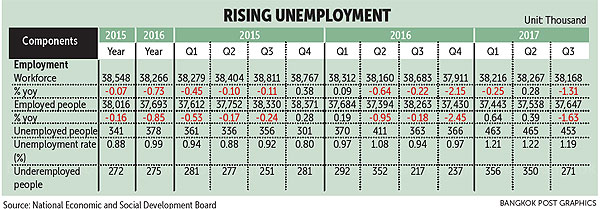Thailand: Think tank warns of worker vulnerability
Thai workers risk losing their jobs with the rise of artificial intelligence (AI), big data and the Internet of Things in production and management processes, especially at large and mid-sized companies, says the state planning unit.
Porametee Vimolsiri, secretary-general of the National Economic and Social Development Board (NESDB), said large firms have a tendency to opt for more automated production processes in order to increase efficiency.
The phenomenon will lead to changes in the pattern of production and services, such as the use of highly precise AI systems to analyse and collect statistical data in the banking industry or the use of automation in production processes, increasing the likelihood that firms will keep workers only in necessary positions such as machine operators.
An increase in the number of online businesses, including e-commerce, online booking and automated check-in, will inevitably affect those in sales and customer service positions, while demand for online systems operators will increase accordingly.
“The new generation of workers needs to be well-equipped with essential skills that enable them to effectively and flexibly respond to new job patterns and the needs of employers in the digital era,” Mr Porametee said. “Such skills are, for example, world knowledge, technology skills, big data analytics and collective skills, language skills, as well as flexibility.”
He also urged employers to pay attention to upgrading technology capabilities and said the government must offer training to workers to ensure they have the skills to compete.
The NESDB reported that workers at high risk of losing their jobs to disruptive technology include those who work in primary schools and secondary high schools.
This group accounted for 65% of those unemployed in the third quarter this year.

In a related development, the NESDB said yesterday the unemployment rate rose to 1.19% (453,000 jobless people) in the third quarter this year from 0.94% (363,000) in the same period last year.
“The unemployment rate in the third quarter was quite high compared with the normal rate averaging 1% or 400,000 jobless people,” Mr Porametee said.
The government’s think tank said the total workforce stood at 38.16 million people in the third quarter, down 1.3% year-on-year, with the number of employed people at 37.64 million, down 1.6% year-on-year.
The decline was largely down to changes in the pattern of production, with greater use of more advanced technology in both production and business processes, and export expansion in capital-intensive industries such as electronics, cars and chemicals.
Labour-intensive industries, such as textiles and clothing, have seen relatively slow export growth, with some products still waiting to be redistributed out of inventory.
Nonetheless, the NESDB said employment should rise in the final quarter based on anticipated economic growth driven by private investment and exports.
Source: https://www.bangkokpost.com/business/news/1374415/think-tank-warns-of-worker-vulnerability


 Thailand
Thailand




